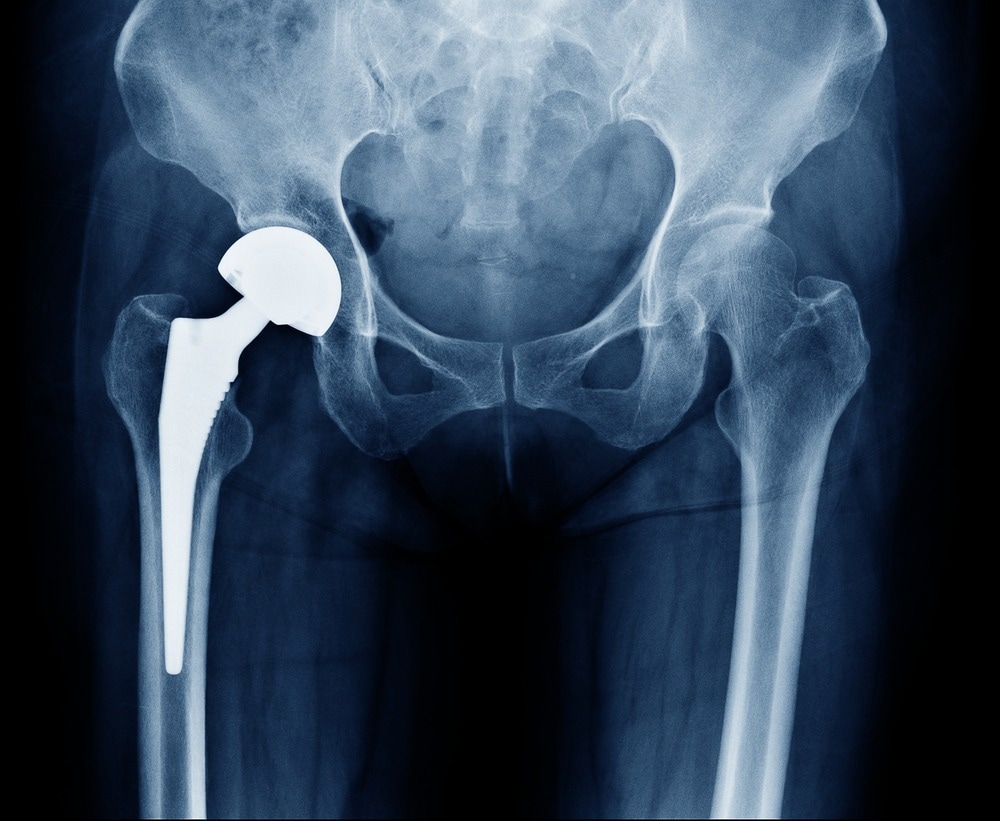As researchers evaluate their use of robots in hip replacement surgery for the first time, their surgical capabilities will be put to the test. The goal is to compare this technology to their human counterparts to ascertain whether utilizing robots improves the results of hip replacement surgery.

Image Credit: ChooChin/Shutterstock.com
One of the most frequent procedures carried out by the NHS is hip replacement surgery.
The National Institute for Health and Care Research (NIHR) has provided £1 million in funding for groundbreaking RACER-Hip Research, which, coupled with the ongoing RACER-Knee study launched last year, will provide fresh insight into the efficacy of robotic-assisted surgery in the NHS.
The Warwick Medical School of the University of Warwick, the Royal Orthopedic Hospital (ROH) in Birmingham, and the University Hospitals Coventry and Warwickshire (UHCW) NHS Trust will be collaborating.
Over the past three years, notably in the USA, there has been a sharp growth in robotically assisted hip and knee replacement surgeries. The NHS is implementing robotic systems, which are then promoted to the public as cutting-edge best practices. However, there is currently scant data to support the claim that these procedures are superior to traditional surgery.
A robotic arm prepares the bone and installs the components according to a pre-programmed three-dimensional blueprint during robotic-assisted hip replacement surgery.
It is believed that utilizing a surgical robot enables more accurate, consistent surgical approaches, which might also assist in eliminating variation and prevent unfavorable results and problems that may necessitate the repetition of surgery.
Two surgeons, Professor Ed Davis from the Royal Orthopaedic Hospital Birmingham and Peter Wall from the Royal Orthopaedic Hospital Birmingham and Warwick Clinical Trials Unit at the University of Warwick, are leading the study.
The RACER-Hip study is a significant investment by the NHS to examine the effectiveness of robotic hip replacement surgery. Robotic technology has the potential to revolutionize hip replacement surgery, however, the first step to this is understanding whether it can help enhance the care surgeons provide.
Peter Wall, Warwick Clinical Trials Unit, University of Warwick
Wall added, “We are really excited that some centers such as Northumbria Healthcare NHS Foundation Trust have been provided with a robot specifically to take part in this research.”
The research will help orthopedic surgeons across the world to better understand the most effective tools for performing hip replacement surgery and ensure the very best outcomes for their patients. This study will also include an in-depth health economic analysis to inform the NHS if this technology should be widely adopted.
Ed Davis, Professor, Royal Orthopaedic Hospital Birmingham
For the purpose of determining which surgical approach yields the best results, an equal number of participants will be randomly assigned to each treatment group. To determine which approach offers the NHS the most value, questions concerning people’s long-term quality of life and capacity to execute tasks will be asked.
Over the next months, the researchers will recruit participants from at least six NHS institutions in England and Scotland. The Northumbria Healthcare NHS Foundation Trust recently received one of the robots for the experiment, marking the first time this service will be accessible for hip surgeries within the NHS in the Northeast of England.
The first location has already been opened at the Royal Orthopaedic Hospital. Stryker, the company that makes the robot, will cover the study’s expenses so that hospitals do not have to pay more to participate.
The RACER-Hip trial joins the RACER-Knee project, which started recruiting participants a year ago and is working to address the same issues regarding knee replacement surgery. The NHS has committed a sizeable sum of money—more than £3 million—to the RACER research in an effort to prove the value of robotic joint replacement surgery.
Leading medical organizations including the British Hip Society, the British Association of Knee Surgery, and the Royal College of Surgeons all acknowledge the significance of and support the research program that will position the UK as a global leader in robotic joint replacement surgery research.